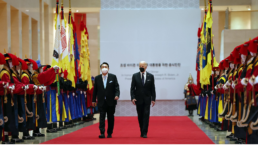The US is once again ensuring extended deterrence, but that is coming with its own host of issues with Beijing and Pyongyang.
by Jae-Jung Suh, Responsible Statecraft
Can President Biden strengthen the extended deterrence over South Korea as he promised during his summit meeting with President Yoon Suk Yeol in April in a way that reduces the South’s interest in developing its own nuclear weapons without increasing the North’s arsenal?
Is it possible that the U.S. security commitment to defend its ally helps the United States focus on maintaining the peace and security of the status quo, thus perpetuating the Korean War that has been sustained with an armistice for 70 years, and now full of risks for escalation to nuclear exchanges with North Korea or for expansion to a new cold war?

While the Biden administration succeeded in crafting the Washington Declaration that helped quiet South Korean voices clamoring for their own nuclear weapons, its success only brought these challenging questions to the fore. Now it has to answer them as it implements the Declaration.
On July 18, the Nuclear Consultative Group (NCG), a key component in the Washington Declaration designed to restore Seoul’s confidence in Washington’s commitment to extended deterrence, held its inaugural meeting in Seoul.
Recent Posts
‘Unconstitutional. Unethical. Authoritarian.’ ICE Bars Millions Of Immigrants From Bond Hearings
July 18, 2025
Take Action Now One watchdog said the new policy “seems like a blatant attempt to stop them from exercising their right to due process.”……
Americans Are Not Nearly Alarmed Enough About Climate Change
July 18, 2025
Take Action Now Americans still don’t comprehend how imminent, dangerous, and far-reaching the threat is—and journalists are partly to blame.By…
The IRS Is Building A Vast System To Share Millions Of Taxpayers’ Data With ICE
July 17, 2025
Take Action Now ProPublica has obtained the blueprint for the Trump administration’s unprecedented plan to turn over IRS records to Homeland Security…
Israel’s Sudden Assault On Syria Is Unchecked Aggression
July 17, 2025
Take Action Now Jerusalem is bombing Damascus and threatening al-Sharaa’s rule, while Washington was hoping to help the nascent government on…




